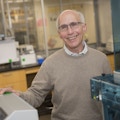Lee Rubin, Ph.D.
Principal Faculty, Harvard Stem Cell Institute, Harvard UniversityLee Rubin’s website
Lee Rubin is a professor of stem cell and regenerative biology at Harvard University and co-director of the neuroscience program at the Harvard Stem Cell Institute. He received his A.B. degree from Cornell University and his Ph.D. from Rockefeller University. He did postdoctoral training at Harvard Medical School (with Gerald Fischbach) and at the Stanford University School of Medicine.
Rubin was trained as a developmental neurobiologist, but he has had broad exposure to translational neuroscience research in both academia and industry. Earlier in his career, his group investigated the cell biology of the blood-brain barrier and its modulation. His laboratory later discovered the first small-molecule agonists and antagonists of the hedgehog signaling pathway. The pathway had been studied originally for its role in neural development, but it turned out to be implicated in forms of skin cancer and brain tumors. One of the antagonists was developed by Genentech and is now approved as a treatment for metastatic basal cell carcinoma. One of the agonists is now widely used by stem cell investigators to produce motor neurons and other types of neurons from stem cells. Since coming to Harvard, Rubin has focused on producing patient-specific neurons from induced pluripotent stem cells to model neurological diseases, including Parkinson’s disease and the neuromuscular disorders amyotrophic lateral sclerosis and spinal muscular atrophy. Because of his interest in neurodegenerative disease, his lab also began studying aging, which itself constitutes a major risk factor for several neurodegenerative diseases. These studies led to the observation that blood contains “anti-brain-aging” factors. One of them is GDF11, an endogenous circulating protein capable of improving brain vasculature and regulating neurogenesis.
Project:
Understanding how bloodborne factors improve the function of the aging brain